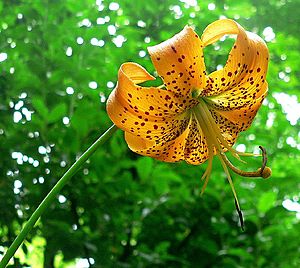Turk's cap lily facts for kids
Quick facts for kids Turk's cap lily |
|
|---|---|
 |
|
| Lilium superbum in Great Smoky Mountains National Park, North Carolina | |
| Scientific classification | |
| Kingdom: | |
| (unranked): | |
| (unranked): | |
| Order: | |
| Family: | |
| Genus: | |
| Species: |
L. superbum
|
| Binomial name | |
| Lilium superbum L. 1753 not Thunb. 1784
|
|
| Synonyms | |
|
|
The Turk's Cap Lily (scientific name: Lilium superbum) is a beautiful wild flower. It is a type of true lily. You can find it growing naturally in eastern and central North America. People also call it the turban lily, swamp lily, lily royal, or American tiger lily. This plant grows from New Hampshire and Massachusetts in the east. Its range goes west to Illinois, Missouri, and Arkansas. It also grows south into Georgia, Alabama, Mississippi, and Florida.
Contents
What the Turk's Cap Lily Looks Like
The Turk's Cap Lily can grow quite tall. It usually reaches between 3 to 7 feet (about 1 to 2 meters) high. Each plant typically has three to seven flowers. However, some special plants have been seen with as many as 40 flowers on one stem!
This lily can grow well in wet places. Its size, shape, and color can be different from one plant to another. The flowers can be a deep yellow, orange, or even a reddish-orange color. The tips of the petals are often reddish.
A special green star shape is found at the center of its flowers. This green star helps you tell the Turk's Cap Lily apart. It looks different from other "tigerlilies" that might have escaped from gardens.
How People and Animals Use the Lily
The roots of the Turk's Cap Lily were an important food source. Some Native American groups used them for food.
The bright flowers are also very useful. They provide sweet nectar for animals. Hummingbirds love to drink from them. Larger insects also visit the flowers for their nectar.
Protecting the Turk's Cap Lily
The Turk's Cap Lily is a special plant. Because of this, it has different protection levels in various places.
- It is listed as endangered in Florida, New Hampshire, Alberta, and Saskatchewan. This means there are very few of these plants left in the wild in these areas. They are at high risk of disappearing forever.
- It is considered threatened in Kentucky. This means it could become endangered soon if we don't protect it.
- In New York, it is listed as exploitably vulnerable. This means people could easily over-collect or harm the plant, making it harder for it to survive.
Why It's Called Turk's Cap Lily
The common name "Turk's cap" comes from the shape of the flower. The petals curve backward, or "reflex." This shape looks a bit like a type of hat. This hat was traditionally worn by early Turkish people.
Important Safety Information for Pet Owners
Cats and Lilies
If you have cats, it's very important to know about lilies. Cats are extremely sensitive to lily toxicity. If a cat eats any part of a lily, it can be very dangerous and often deadly.
If you have cats at home or in your garden, it's best not to have this plant. Also, be careful with dried lily flowers. Pollen from dried flowers can get on a cat's fur. When the cat cleans itself, it might eat the pollen.
If you think your cat has eaten any part of a lily, get help right away. Take your cat to a vet immediately. Quick treatment can help reduce the amount of harmful substances absorbed. This can include giving activated charcoal or making the cat vomit. Getting lots of fluids through an IV can also help protect the kidneys. This can greatly increase the chances of your cat surviving.
Traditional Uses of the Bulbs
Long ago, some Native American tribes used the bulbs of the Turk's Cap Lily. They would make the bulbs into soups. This shows how important this plant was for food in the past.
See also
 In Spanish: Lilium superbum para niños
In Spanish: Lilium superbum para niños

